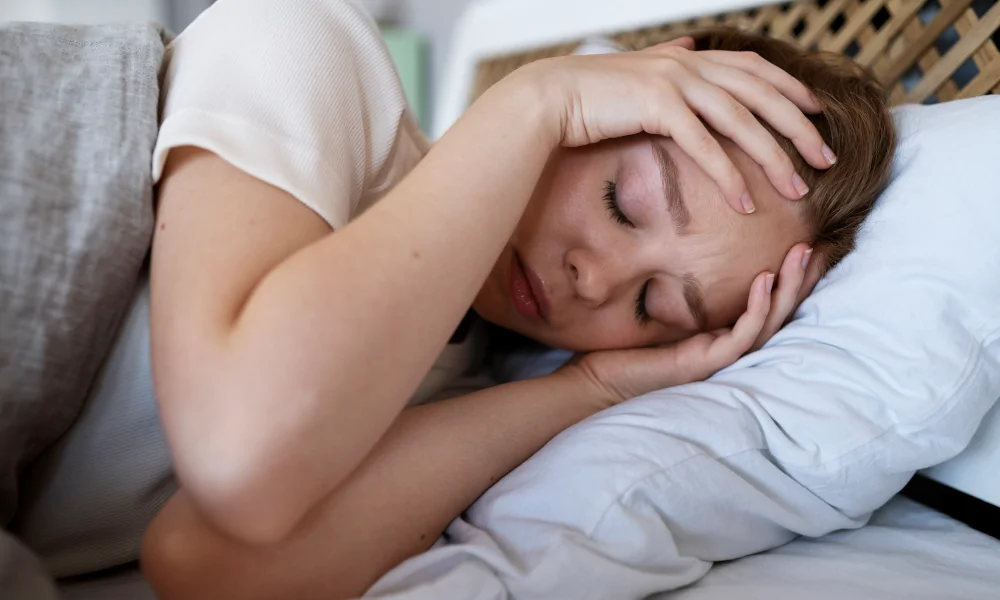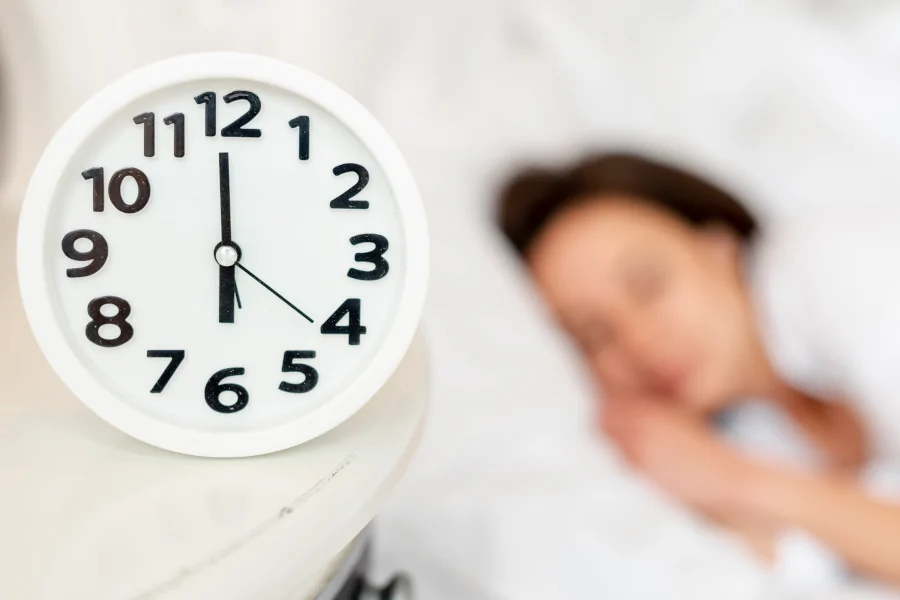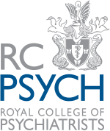Sleep is an essential function that allows our bodies and minds to rest and recharge. Not getting enough sleep can negatively impact our mental and physical well-being. When we’re sleep-deprived, it becomes harder for our brains to function correctly. We can’t remember things and think clearly. But the effects of sleep deprivation go beyond just our minds. It can also weaken our bodies, making us more likely to get sick and have other health problems.
In the UK, sleep deprivation is a significant concern. According to NHS Digital, in 2022, 34.0% of children aged 7 to 16 experienced sleep problems on three or more occasions over seven nights. The prevalence of sleep deprivation was even more pronounced among young people aged 17 to 23, with 64.0% reporting similar sleep difficulties. This article will explain sleep deprivation, including its causes, symptoms, and effects. It will also discuss recommendations for high-quality sleep.
What is Sleep Deprivation?
Sleep deprivation occurs when a person consistently doesn’t get the proper amount of sleep that their body requires to feel awake and alert. People vary in how little sleep they need to be considered sleep-deprived. Some people, such as older adults, seem to be more resistant to the effects of sleep deprivation, while others, especially children and young adults, are more vulnerable.
An adult requires an average of 7 to 9 hours of sleep per night, but these needs vary by age group. For instance, toddlers and babies need between 12 and 17 hours of sleep daily; school-aged children require 9 to 13 hours.
It is important to note that not just the quantity but also the quality of sleep matters. Disturbance in the sleep cycle can lead to sleep deprivation even if the sleep duration seems adequate. Even if an individual spends 8 hours in bed, they may not achieve the deep, restorative sleep necessary for the body to function at its best.
How Does Sleep Deprivation Affect Your Body?
Sleep deprivation significantly affects both mental and physical health. Here’s how it can affect various systems:
Nervous System: Sleep is crucial for cognitive processes. Lack of sleep impairs attention, alertness, concentration, reasoning, and problem-solving, making learning difficult. It can also lead to emotional instability, mood swings, and decreased motivation.
Mental Health: Sleep deprivation can also have a significant impact on mental health. Lack of quality sleep can make it more challenging for individuals to manage and process emotions. Those experiencing sleep deprivation are more likely to develop symptoms of depression and anxiety, as the cognitive impairments and emotional instability can impact their psychological well-being.
Immune System: Sleep deprivation can weaken the immune system, making individuals more susceptible to infections. One key mechanism by which sleep deprivation impairs immune function is disrupting the production and regulation of important immune cells, such as T cells and natural killer cells. This disruption can make the person more susceptible to contracting various infections, as the body’s first line of defence is compromised.
Respiratory System: Sleep deprivation can worsen respiratory conditions, including obstructive sleep apnoea, and increase susceptibility to respiratory infections such as the common cold. Additionally, insufficient sleep may exacerbate symptoms in individuals with asthma. It can trigger increased inflammation in the airways, leading to more severe asthma symptoms, such as wheezing, coughing, and shortness of breath.
Digestive System: Sleep deprivation significantly disturbs the balance of key hormones that regulate hunger and appetite. Specifically, it can decrease leptin levels, the hormone that signals satiety and fullness, and increase ghrelin levels, stimulating hunger. This leads to an increased appetite, which ultimately causes weight gain.
Endocrine System: Adequate sleep is essential for the proper functioning of the endocrine system. Testosterone production requires continuous sleep, typically during the first REM (rapid eye movement) episode. Disruptions in sleep patterns throughout the night can adversely impact testosterone levels.
Similarly, sleep and exercise influence the production of growth hormone, which is essential for muscle development, cell repair, and overall growth. The pituitary gland releases growth hormone continuously throughout the day, but adequate sleep and physical activity enhance this release.
Cardiovascular System: Sleep affects processes that keep the heart and blood vessels healthy, including those that affect blood sugar, blood pressure, and inflammation levels. Not getting enough sleep can put extra strain on your heart and increase your risk of developing conditions like high blood pressure or heart disease.
Symptoms of Sleep Deprivation
The symptoms of sleep deprivation include:
Daytime Sleepiness: Daytime drowsiness is often an initial sign of sleep deprivation. When an individual does not receive adequate rest, it results in daytime fatigue and a strong tendency to sleep during the day.
Fatigue: Sleep deprivation causes physical and mental exhaustion. This lack of energy and focus can decrease productivity in completing routine tasks.
Irritability: Lack of sufficient sleep can significantly impact your mood. Sleep-deprived individuals are more prone to irritability, mood swings, and aggravated emotional reactions.
Cognitive Impairment: Insufficient sleep can also affect cognitive function. You may experience difficulty in focusing, forgetfulness, and decreased processing ability.
Slowed Reaction Times: Insufficient sleep slows down a person’s reflexes and reaction time. Slowed reaction time can be dangerous, especially when driving or using machinery. Reduced responsiveness can increase the risk of accidents and injuries.
Headaches: Lack of sleep can trigger tension headaches or migraines. The physical strain caused by inadequate rest can lead to these painful head sensations. Persistent headaches due to sleep deprivation can also impact an individual’s ability to concentrate and perform daily tasks effectively.
In cases of extreme sleep deprivation, individuals may experience symptoms that closely resemble alcohol intoxication. These can include microsleeps (brief, involuntary moments of sleep), uncontrolled eye movements, slurred speech, drooping eyelids, hand tremors, and even visual and tactile hallucinations. The cognitive impairments associated with severe sleep deprivation can also lead to impaired judgment and increased impulsive or reckless behaviour.
Risk of Chronic Conditions
When individuals do not get enough sleep, their bodies may need foods rich in fats and carbohydrates that will contribute to weight gain and obesity. Research has linked sleep deprivation with an elevated risk of various cardiometabolic conditions. Individuals who regularly sleep less are more likely to develop obesity, high cholesterol levels, diabetes, and hypertension.
The combined effect of these metabolic and cardiovascular changes associated with sleep deprivation is a marked increase in the risk of developing various life-threatening conditions, including heart attacks, strokes, and other cardiovascular diseases. Additionally, chronic sleep deprivation has been associated with an increased morbidity and mortality of cardiovascular diseases.
Stages of Sleep Deprivation
Sleep deprivation is categorised into various stages that help recognise the severity of sleep insufficiency. As the duration of sleep deprivation increases, the effects on the body and mind become more severe.
Stage 1: After going without sleep for at least 24 hours, the effects of sleep deprivation can resemble alcohol intoxication. Individuals may experience impaired cognitive abilities, poor judgement, and unsafe driving.
Stage 2: In the second stage, the symptoms worsen. People may suffer from more frequent microsleeps, which are brief, involuntary moments of sleep. Additionally, they may have an increasingly difficult time thinking and focusing on tasks.
Stage 3: As sleep deprivation progresses, individuals may start experiencing hallucinations. Their ability to effectively communicate and interact with others becomes significantly impaired at this stage.
Stage 4: In the final stage, persistent hallucinations become common, making it challenging for the person to distinguish reality from imagination. Overall functioning is severely reduced, and the individual may have difficulty performing even basic tasks.
Causes Of Sleep Deprivation
Several factors can lead to sleep deprivation. These include:
Shift Work: Irregular work schedules, especially night or rotating shifts, can disturb the body’s natural circadian rhythm. This misalignment between the body’s internal clock and the external environment can make it challenging for individuals to fall asleep, leading to chronic sleep deprivation.
Alcohol Use: Excessive alcohol consumption, especially when misused, interferes with restful sleep and contributes to sleep deprivation. Alcohol is a depressant that can fragment sleep, reducing the duration of REM sleep. Excessive or prolonged alcohol use can lead to dependence and further exacerbate sleep issues.
Stimulant Use: Using stimulants such as caffeine late in the day can disturb the body’s natural sleep-wake cycle. These substances can delay the release of melatonin, the hormone that regulates sleep, making it harder to fall asleep.
Sleep Hygiene: Factors such as irregular sleep schedules, exposure to blue light from electronic devices before bedtime, and an unsuitable sleep environment (e.g. excessive noise, light, or uncomfortable temperature) can all contribute to sleep deprivation by disrupting the body’s ability to initiate and maintain quality sleep.
High Stress Levels: Chronic stress can significantly impact sleep, as it can cause anxiety and physiological arousal, making it difficult to relax and fall asleep.
Unfamiliar Sleeping Places: Sleeping in new or unfamiliar environments, such as hotels during travel, can disturb your usual sleep routine.
Additionally, medical conditions such as sleep apnoea, degenerative brain disorders, mental health concerns, pain, insomnia, and medications can lead to sleep deprivation. Short-term illnesses like the common cold or flu may also disturb sleep temporarily.
What’s the Best Treatment for Sleep Deprivation?
Sleep deprivation can be a challenging condition, but several treatment options can be effective.
Behavioural Changes
Improving sleep quality and quantity starts with adjusting daily habits and behaviours. The following steps can help to enhance sleep:
- Maintain a consistent sleep schedule by going to bed and waking up at the same time each day, even on weekends.
- Optimise your sleep environment by keeping the bedroom dark, quiet, and cool.
- Establish a relaxing pre-sleep routine, such as reading or taking a warm bath.
- Avoid large meals, caffeine, and alcohol close to bedtime as they can interfere with sleep quality.
- Incorporate regular physical activity into your daily routine to promote better sleep.
Medications
Certain medications can improve sleep quality. These include drugs specifically designed to induce sleep or medications that address underlying causes of sleep disruption, such as anxiety or pain. For example, anxiolytic (anti-anxiety) medications or pain relievers may be prescribed for individuals experiencing sleep deprivation due to stress or chronic pain, respectively.
However, it is crucial to understand that some medications, particularly benzodiazepines, carry a risk of dependence and potential for abuse. Prolonged use of these medications can lead to tolerance, withdrawal symptoms, and difficulty discontinuing their use, which can further exacerbate sleep problems. So, medications should ideally be prescribed with close medical supervision and for limited durations.
Breathing Support Methods
Various breathing support methods can be used for individuals with sleep-related breathing disorders, such as sleep apnoea. These may include special pillows or supports, oral appliances that adjust the jaw position, surgical interventions to widen the airway, and positive airway pressure machines that keep the airway open during sleep.
Is There a Difference Between Sleep Deprivation and Insomnia?
While sleep deprivation and insomnia are closely related, they are different conditions. Sleep deprivation refers to not obtaining the recommended amount of sleep, regardless of the underlying cause. It can occur due to lifestyle factors, work demands, poor sleep habits, or other circumstances that prevent an individual from getting the necessary sleep.
On the other hand, Insomnia is a sleep disorder characterised by persistent difficulty in falling asleep, staying asleep, or waking up too early and being unable to return to sleep. Insomnia can be acute, lasting for a short period, or chronic, persisting for weeks or months. Insomnia patients often experience daytime consequences, such as fatigue, irritability, and impaired cognitive function.
It’s important to note that while insomnia can lead to sleep deprivation, not everyone who is sleep-deprived has insomnia. Sleep deprivation can be voluntary, such as working long hours or staying up late, whereas insomnia is a medical condition that often requires specialised treatment.
When should you look to seek professional help?
Sleep deprivation can often be a tricky situation. While environmental factors may play a role in poor sleep, underlying health conditions may also affect it. As discussed, one of the more common causes of sleep deprivation is insomnia, which, if not diagnosed and treated appropriately, can lead to other health concerns.
As a leading sleep physician and psychiatrist, we offer consultations for those with sleep deprivation and insomnia. Please contact me if you require further advice on how to fall asleep or are struggling for other reasons.









